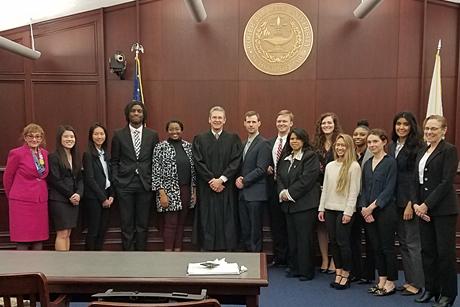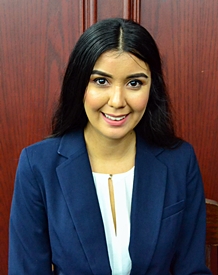'Unmatched Opportunities'
For 3L Karen Lara, a recent decision by the U.S. Supreme Court to grant cert. in a case she first saw argued at RWU Law as a 1L symbolizes the progress of her own educational journey.

For Karen Lara, a recent decision by the U.S. Supreme Court to grant cert. in a case she first saw argued at Roger Williams University School of Law as a 1L symbolizes the progress of her own educational journey.
It began on March 25, 2019, when the Honorable John J. McConnell, Jr., Chief Judge of the United States District Court for the District of Rhode Island, held court – as has become his yearly custom – in the Honorable Bruce M. Selya Appellate Courtroom at RWU Law’s main campus in Bristol.
As a packed room of students looked on, the court heard argument on summary judgment motions in a pair of consolidated civil cases. One issue raised was whether it was lawful for a police officer to enter a home without a warrant in response to receiving a complaint that someone inside the home was despondent, angry, and had access to a gun.
“The entire 1L class attended the arguments, which were followed by Q & A sessions with the lawyers and then later with the judge,” recalled Professor Michael Yelnosky, who was dean at the time. “It was, as always, a great event.”
“It was unbelievable,” agreed Lara, who was among those 1Ls-now-3Ls. “We got to see a real district court case being argued before an actual district court judge, in real time, right in our own school. And afterward we could ask the judge and lawyers questions about what we had just seen. I'm not sure most of us quite understood the magnitude of that opportunity at the time.”
Such events, however, are an integral mainstay of a Roger Williams legal education.
“When courts hear arguments at the law school, it provides our students with extraordinary opportunities to see the practice of law in action and get to know some of the nation’s leading jurists,” said Dean Gregory W. Bowman. “At RWU Law, we deeply appreciate our strong relationships with the federal and state judiciaries.”
Judge McConnell ruled that the warrantless entry into the plaintiff’s home and ultimate seizure of the plaintiff’s guns was justified by the “community caretaking” exception to the warrant requirement of the Fourth Amendment, and granted the defendants’ summary judgment on that claim. Caniglia v. Strom, 396 F. Supp. 3d 227 (D. R.I. 2019). On appeal, a panel of the United States Court of Appeals for the First Circuit affirmed in an opinion written by the RWU Law courtroom’s namesake, Judge Selya. Caniglia v. Strom, No. 19-1764 (1st Cir. 2020).

In the meantime, Lara had established herself as a standout student at RWU Law, a member of the school’s Honors Program and Law Review. The Arizona native – whose parents originally came to the U.S. from Mexico as migrant farm workers – also served as president of the Latino Law Students Association, and as a teaching assistant for Professor Colleen Brown.
“Seeing the sacrifices my parents made when we were kids, I really wanted to take advantage of the opportunities they were giving me,” Lara said. “They used to say, ‘Our job is on the farms, your job is to go to school and study hard.’ So I learned to take my education very seriously.”
As it turned out, Lara’s educational trajectory matched that of the case she’d heard during her 1L year. The Honorable O. Rogeriee Thompson (a member of RWU Law’s Board of Directors) selected Lara as a judicial intern at the First Circuit during the summer of 2019 – just as Caniglia happened to be passing through that court.
“It was such a wonderful internship opportunity, right after completing my 1L year, to go and work at the First Circuit,” she said. While Caniglia itself never landed on her desk, “I was there to experience this next step in the process.”
A few weeks ago, on November 20, 2020, the United States Supreme Court granted certiorari in the case on the question, “Whether the ‘community caretaking’ exception to the Fourth Amendment’s warrant requirement extends to the home.”
And while the pandemic has kept Lara at home in San Luis, Ariz., for most of 2020, she noted that “RWU Law actually did get me to the Supreme Court last year!" She had taken the Honors Perspectives course, “U.S. Supreme Court Cases,” taught by Professor Jared Goldstein, which culminated in a visit to Washington, D.C., to observe cases being argued at the Court.
“So there are three levels on which I relate to this case, and they all emphasize the unmatched opportunities that I received at RWU,” Lara said. “I loved my time there. I am very grateful to have received such in-depth exposure to so many aspects of the law.”
Lara originally came to Rhode Island to support her fiancé, Manuel Lugo ’20, who had enrolled at RWU Law a year ahead of her and is now an attorney with the Florence Immigrant and Refugee Rights Project in Phoenix, Ariz. Before starting law school herself in 2018, Lara worked as a legal assistant at the Providence law firm of Motley Rice for partner Robert J. McConnell (Judge McConnell's brother, who was honored in his own right as one of RWU Law’s 2019 Champions for Justice), an experience she described as "extraordinary and eye-opening."
Lara plans to join Lugo in Arizona upon graduation, but added, “I’m sure we’ll be visiting Rhode Island pretty often!”

